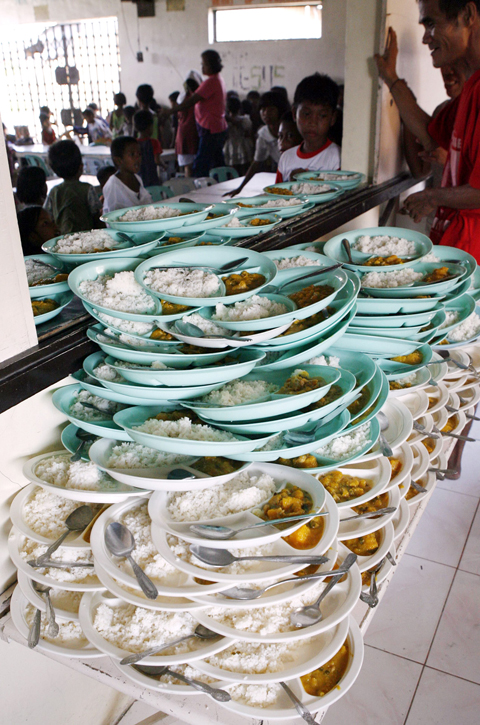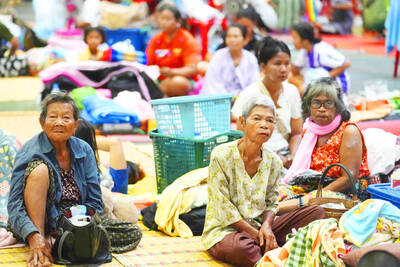Large pockets of extreme poverty and hunger persist in Asia, where the global downturn makes it more difficult to achieve UN goals to reduce the ranks of the poor, the Asian Development Bank (ADB) said yesterday.
Supporting smaller businesses, where most Asians are employed, is key to fueling domestic demand and growth, the Manila-based lender said in a report on key economic indicators.
In 19 Asian economies, including the most populous China and India, more than 10 percent of people live on less than US$1.25 a day and more than 10 percent are malnourished. This is despite the region’s success over the last 15 years in cutting the number of poor from one in two to around one in four, the report said.

PHOTO: REUTERS
Nepal is the worst off, with 55.1 percent of its population surviving on less than US$1.25 a day. In China and India, 15.9 percent and 41.6 percent of the population live below the poverty line respectively.
Income gap remains wide in many other countries.
More than 30 percent of Tajikistan’s population suffers from hunger, as do 20 percent to 30 percent of the people in Armenia, Bangladesh, Cambodia, Mongolia, India, Pakistan, Sri Lanka and East Timor, the ADB said.
Among the so-called UN Millennium Development Goals is cutting in half extreme poverty and hunger by 2015 and reducing maternal mortality by three-quarters over the same period.
The report said that Asia faces serious challenges in meeting goals linked to sanitation and maternal deaths, which remain unacceptably high in countries such as Afghanistan, Nepal and Laos.
About 1,800 out of every 100,000 Afghan women die in childbirth, while more than a quarter of urban households in 13 countries still lack access to improved sanitation, the bank said.
For Asia to cope with the global downturn, it needs to strengthen domestic demand to sustain growth, chief ADB economist Lee Jong-wha said.
Global demand for Asian exports was expected to remain sluggish, but the region could see a V-shaped recovery in 2010, he said.
Governments should focus not only on fiscal stimulus and large enterprises but on supporting small and medium-sized enterprises — where most Asian workers are employed — to build a substantial urban middle class with spending power, he said.
“It’s unlikely that Asia can export its way out of this slump, as they did after the 1997-98 Asian financial crisis,” Lee said. “This crisis clearly shows that Asia cannot rely only on external demand but must diversify its sources of growth and revive its domestic industries.”
Lee said the ADB would revise its growth forecast for Asia next month.
In March, the bank predicted a 3 percent growth rate this year for emerging East Asian economies and 6 percent growth next year, which is still below the 9.7 percent expansion in 2007.

FOREST SITE: A rescue helicopter spotted the burning fuselage of the plane in a forested area, with rescue personnel saying they saw no evidence of survivors A passenger plane carrying nearly 50 people crashed yesterday in a remote spot in Russia’s far eastern region of Amur, with no immediate signs of survivors, authorities said. The aircraft, a twin-propeller Antonov-24 operated by Angara Airlines, was headed to the town of Tynda from the city of Blagoveshchensk when it disappeared from radar at about 1pm. A rescue helicopter later spotted the burning fuselage of the plane on a forested mountain slope about 16km from Tynda. Videos published by Russian investigators showed what appeared to be columns of smoke billowing from the wreckage of the plane in a dense, forested area. Rescuers in

‘ARBITRARY’ CASE: Former DR Congo president Joseph Kabila has maintained his innocence and called the country’s courts an instrument of oppression Former Democratic Republic of the Congo (DR Congo) president Joseph Kabila went on trial in absentia on Friday on charges including treason over alleged support for Rwanda-backed militants, an AFP reporter at the court said. Kabila, who has lived outside the DR Congo for two years, stands accused at a military court of plotting to overthrow the government of Congolese President Felix Tshisekedi — a charge that could yield a death sentence. He also faces charges including homicide, torture and rape linked to the anti-government force M23, the charge sheet said. Other charges include “taking part in an insurrection movement,” “crime against the

POINTING FINGERS: The two countries have accused each other of firing first, with Bangkok accusing Phnom Penh of targeting civilian infrastructure, including a hospital Thai acting Prime Minister Phumtham Wechayachai yesterday warned that cross-border clashes with Cambodia that have uprooted more than 130,000 people “could develop into war,” as the countries traded deadly strikes for a second day. A long-running border dispute erupted into intense fighting with jets, artillery, tanks and ground troops on Thursday, and the UN Security Council was set to hold an emergency meeting on the crisis yesterday. A steady thump of artillery strikes could be heard from the Cambodian side of the border, where the province of Oddar Meanchey reported that one civilian — a 70-year-old man — had been killed and

POLITICAL PATRIARCHS: Recent clashes between Thailand and Cambodia are driven by an escalating feud between rival political families, analysts say The dispute over Thailand and Cambodia’s contested border, which dates back more than a century to disagreements over colonial-era maps, has broken into conflict before. However, the most recent clashes, which erupted on Thursday, have been fueled by another factor: a bitter feud between two powerful political patriarchs. Cambodian Senate President and former prime minister Hun Sen, 72, and former Thai prime minister Thaksin Shinawatra, 76, were once such close friends that they reportedly called one another brothers. Hun Sen has, over the years, supported Thaksin’s family during their long-running power struggle with Thailand’s military. Thaksin and his sister Yingluck stayed